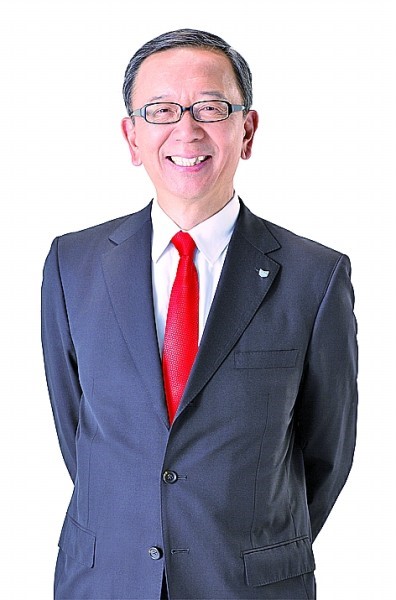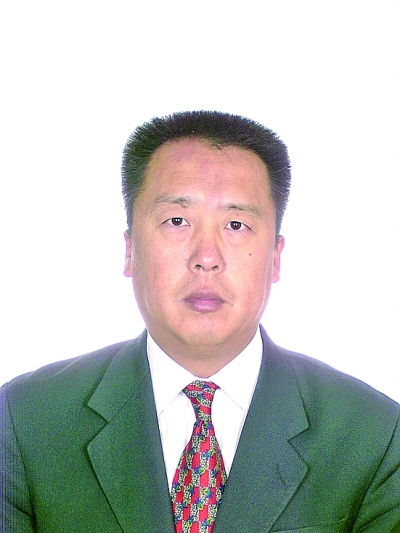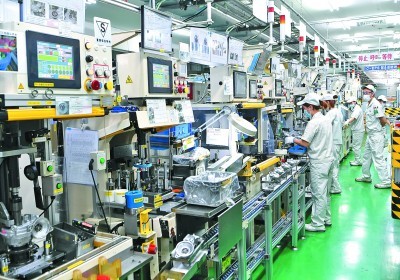


Ozawa Hideki
(Executive Vice President of Canon Inc. President and CEO of Canon (China) Co., Ltd.)

Xiao Lianbing
(Secretary General of the Center for International Exchange, Cooperation and Communication of Guangming Daily)
Foreign investment still values the size and growth of Chinese market despite COVID-19 outbreak.
Xiao Lianbing: During the outbreak of COVID-19, some public opinions claimed that the pandemic will force foreign-funded enterprises out of China. What do you think? In the post-pandemic era, is the Chinese market still as important to foreign-funded enterprises in China as before?
Ozawa Hideki: I don't think the major foreign-funded enterprises will leave China. China has formed a complete support system and boasts skilled technology, excellent talents and good experience. It would be very difficult for foreign-funded enterprises to immediately establish such complete support system in other countries.
Today’s China is the second largest economy in the world and an indispensable part of the global industrial chain. Meanwhile, China is a huge market with stable consumption power and development potential. For foreign-funded enterprises, the size and growth of China’s market are crucial factors when it comes to investment. The decision-making of transnational investment is a long-term, comprehensive and strategic process, which requires comprehensive judgment and consideration. As a Japanese enterprise, Canon has always attached great importance to the Chinese market. Being rooted in China for decades, Canon has witnessed the vigorous development of the Chinese market, and also has grown together with China. Our current investment scope covers various fields of R&D, production and sales. For Canon, the importance of China's strategic position has not changed because of the pandemic.
Xiao Lianbing: With the outbreak of the pandemic, the supply chain of enterprises has become a topic of concern. What are your views on supply chain issues during this special period?
Ozawa Hideki: The pandemic has really changed the world, and shaped the ways in which enterprises operator produce, which is widely known as an industry “Paradigm Shift”. The inherent concepts we had, as well as common sense, including some of the values we hold, are changing. From the perspective of supply chain, China gradually became a world factory since the 1990s. Throughout the decades, many foreign-funded enterprises came to China to invest and build factories to produce products and parts, including the establishment of regional headquarters and other institutions. However, the outbreak of COVID-19 has exposed the vulnerability of the supply chain, and so the diversification of supply chains is a pressing issue for enterprises, from the perspectives of both crisis management and risk management. Canon will further diversify its supply chains in China, so that in case of failure of one supply chain, other supply chains can take its place. In fact, many enterprises are either considering or have started doing so already.
For foreign-funded enterprises, the diversification of supply chains is an issue that needs to be addressed. It is necessary to deploy supply chains well in different countries and regions to deal with possible supply chain risks from the perspective of crisis management and risk management. As for Chinese enterprises, they need to think about ways to solve domestic supply issues in the face of foreign-funded enterprises' procurement needs, and, for example, they may set up plants in Southeast Asian countries such as Thailand, Vietnam and the Philippines. One of Canon’s suppliers has its own production capacity in China, but has also built a subsidiary in Vietnam to supply parts for Canon's factories in Vietnam. Such cooperation will become more common in the future. If a part of Chinese enterprise customers turn to purchase from outside China, Chinese enterprises need to simultaneously to seek overseas development. Therefore, the impact of COVID-19 on the transformation of supply chains will greatly encourage Chinese enterprises to invest and develop overseas. Only in this way can foreign-funded enterprises and Chinese enterprises be developed simultaneously.
China's measures against the pandemic are highly commendable.
Xiao Lianbing: With regard to the supply chain issue during and after the pandemic, some public opinions have politicized the supply chain issue with ulterior motives. What measures has Canon China taken in response to the outbreak of COVID-19 in China?
Ozawa Hideki: Since the outbreak of COVID-19, Canon has been constantly paying attention to the development of the pandemic situation. Canon China launched its internal emergency system and took a series of measures for joint prevention and control. It banned all non-urgent or unnecessary travels, and adjusted the timetable of work resumption in accordance with the policies and requirements issued by different local governments of China and to ensure "mass health". From February 10, some of Canon China’s branches began to resume on-site office work, while travels during rush hours were still avoided and flexible and remote office were allowed to ensure employee safety during the special period. Moreover, Canon China provided free masks to employees. As a measure to prevent infection with the virus, all Canon China branches offered free disinfectants and ensured effective use. When the pandemic broke out in China, Canon Group’s Japan headquarters provided Canon China with relevant materials such as masks and thermometers. Later, when the pandemic spread in Japan, Canon China and other group companies in China extended a helping hand to Japan by providing masks and other materials. With the resumption of production, Canon also adjusted the business strategy and mode in time to meet the actual needs of the company's development and users.
To support diagnosis of COVID-19 in Wuhan, on January 30, Canon (China) Co., Ltd., Canon Medical Systems (China) Co., Ltd. and other related companies of Canon Group jointly donated a "Canon Aquilion Lightning CT" to Tongji Hospital Affiliated to Tongji Medical College of Huazhong University of Science and Technology through the National Health Commission of China. The donation served to alleviate the shortage of local medical imaging testing equipment and contributed to the fight against the pandemic.
Xiao Lianbing: You have witnessed the process of the Chinese government leading the Chinese people to fight the pandemic. What do you think of the measures taken by China? What are your views on China's early resumption of work and production and China's economic trend?
Ozawa Hideki: The Chinese government released pandemic information in a timely, open and transparent manner. The prevention and control measures reported by Chinese media were objective, and the knowledge of pandemic prevention and control was scientific. China's serious attitude towards the outbreak, especially the commitment and fulfillment of the Chinese government, as well as the transparency of the pandemic-related information, including the sharing of virus data and viral gene sequences, is highly commendable. The outbreak of the pandemic right before the Spring Festival did bring a lot of difficulties to its initial prevention. Having experienced the SARS outbreak in Hong Kong in 2003, I am keenly aware that this time, the Chinese government and the Chinese people have made great progress in combating the epidemic in all aspects.
In the face of this major challenge, the government conducted an accurate survey on enterprises. In the process of resuming work and production, the government successively issued a number of preferential policies, providing a lot of policy support for Canon and other foreign-funded enterprises, and alleviating the burden of these enterprises to a certain extent. The pandemic is still spreading worldwide, posing severe challenges to the world economy. Although the pandemic has a certain impact on China’s economy, China has taken the lead in achieving an initial victory against the pandemic, and the economy has also started to recover. Meanwhile, China's huge market volume and especially its current efforts to optimize the industrial structure and promote the pace of industrial and consumption upgrading will undoubtedly bring wider markets and business opportunities. Canon believes that with the introduction of a series of subsequent economic stimuli by the Chinese government and the concerted efforts of various industries, China's economic development will maintain a strong growth momentum in 2020.
A new round of science and technology will promote the development of globalization.
Xiao Lianbing: Scientific research shows that the long-term coexistence of viruses and human beings will become a new normal. In the post-pandemic era, how can enterprises tackle this new challenge?
Ozawa Hideki: The pandemic has brought a lot of changes to people's work and communication methods. The shift of market activities from offline to online is a very typical example. At 8:00 p.m. on July 9 this year, Canon China held an online product launch for the first time in its history. The 30-minute live streaming attracted 1.75 million viewers. As of July 12, the video had received more than 10 million views and triggered 16 million Weibo messages. The online launch, as a new attempt made due to the pandemic, turned out to be a great success.
When a pandemic becomes a regular phenomenon, enterprises are faced with many challenges. Meanwhile, I believe that challenges contain new opportunities. Only by seizing these opportunities can enterprises sustain their development. The pandemic has reshaped many industries; we now see online medical treatments, telecommuting and online education. "Stay-at-home economy" and "cloud-based learning" once have become hot terms. The change in people's living habits has led to the expansion of related industries such as "online conferencing", "online concerts", and "influencer marketing through live streaming". At the same time, people's need for peace of mind and security has brought opportunities for network cameras. In the long run, medical treatment and healthcare sectors will also have huge potential. In the post-pandemic era, the global demand for better medical system infrastructure will continue to expand, which will bring more development opportunities for the industry.
Also Canon China is actively adjusting its business strategy and mode to meet new challenges and seek new development. In this special pandemic period, we pay close attention to the new needs of different users and quickly carry out business innovations. We have launched a series of measures, including machine leasing discounts, remote service, new function development and technical experience sharing, to ease business pressure of production resumption for enterprises, and we introduced various authentication solutions such as facial recognition access control and printing, even with masks on, as well as intelligent temperature measurement.
In terms of service, in order to meet users' demand for after-sales maintenance of printer products, Canon started a cooperation with SF-Fix to launch contactless repair service in order to reduce the risk of infection. Furthermore, we have strengthened online communication to be able to provide continuous services to users and partners.
In this special period, Canon has been actively carrying out a series of activities, such as "to meet challenges with laughter and convey warmth through delight" and "Colorful Mask Friday", to cheer on employees and boost their confidence. At the same time, activities like these help integrate a positive and optimistic spirit into external marketing, as positive energy is delivered to audiences by means of short, fun videos and so on.
Xiao Lianbing: What do you think of the questions that arose around economic globalization during the pandemic?
Ozawa Hideki: As a matter of fact, economic globalization has optimized the combination of various factors of production and the allocation of resources on a global scale, thus accelerating the global economy. Meanwhile, the progress of science and technology has also promoted the process of globalization, greatly stimulating the development of the entire human society, gradually increasing wealth, active trade and investment, reducing absolute poverty, increasing life expectancy and so on. Many countries and regions have benefited from the process of economic globalization to varying degrees and have made their own contributions to the development of globalization. However, economic globalization has also brought us some problems. While promoting the great development of global productivity and accelerating world economy, globalization has brought about common social and economic problems, such as fiercer international competition and increased international risks. Despite these problems, globalization is an irresistible trend. How to maximize the merits of globalization and reduce its problems and risks is an issue which the entire human society needs to address together.
The pandemic lets us feel more deeply that human society is an interdependent community. Whether it is about economic development, climate change or public health, they are common issues facing the whole world, and only through joint efforts, communication and cooperation can we effectively solve them. New technologies, such as AI, big data and biotechnology, will bring more unexpected changes to global development and human production and life, promote the further development of economic globalization and drive the progress of the entire human society.
With the goal of "living and working together for the common good", Canon adheres to the strategy of internationalization and diversification. At present, more than 75% of our sales volume comes from outside Japan, and we will continue to adhere to this strategy in the future.
Deepening reform and opening up will expand the development space of foreign-funded enterprises.
Xiao Lianbing: You have been working in China for many years. As a witness, what do you think of China's reform and opening-up?
Ozawa Hideki: I came to China for the first time in the early 1980s, when China was in the early stage of reform and opening-up, and the market economy was yet to unfold. In 2005, I came to China again and started my career as CEO of Canon China. This is my 16th year of living and working in Beijing. Compared with my first visit to China, great changes have taken place. Whether in terms of urban infrastructure, people's living standards, or scientific and technological strength, China has achieved remarkable successes.
I feel a change in the consciousness of Chinese people. Since the reform and opening-up, more and more Chinese young people have developed a sense of resourcefulness and competition. At the same time, more and more people study abroad to broaden their horizons. Nowadays, Chinese people are becoming more and more open-minded and have broader visions. Furthermore, China has become a major destination for people all over the world. I see China's leapfrog technological changes. China's science and technology has achieved great development, and Chinese enterprises have also risen rapidly. In the world's top 500 enterprises, the number of Chinese enterprises has been increasing year by year. From the increasing number of patent registrations in China, we can see that China has moved from "Made in China" to "Mind in China". Forty years ago, Japanese, European and American enterprises had great advantages in technology, but now the opposite is true in some fields, because many Chinese enterprises, especially internet enterprises, have mastered many of the most advanced technologies. Nowadays, Japanese or European and American enterprises need to learn from Chinese enterprises.
I believe that China's reform and opening-up has brought opportunities for foreign-funded enterprises. China's stable social environment, sound financial policy and good investment environment have brought great business opportunities and development space for Canon and other foreign-funded enterprises to develop their business in China, and China has rapidly become one of the most important markets for Canon Group in recent years. China is also actively adjusting its industrial structure. With the upgrading of industry and consumption, the overseas demand of China’s high-end manufacturing industry and high-tech services industry is growing rapidly, such as the import of important equipment and key parts, as well as high-quality goods including electronic products. All these create rare development opportunities for Canon, which has a diversified product layout.
The promulgation of the Foreign Investment Law of China January this year means that China will create a more equitable business environment, further expand the opening-up and fully implement the national treatment for foreign investors, thus boosting the confidence of global investors, and helping Canon and other foreign-funded enterprises to further broaden the types and fields of business in China and participate more widely in China's construction. Although the current pandemic situation has brought many difficulties to China's economic development and enterprise operation, Canon has fully felt the Chinese government's close attention to the operation and development of foreign-funded enterprises in the process of resuming work and production. We believe that in this special period, with the gradual implementation of the various details of the foreign investment law, the Chinese government will continue to launch various targeted support policies for foreign-funded enterprises to help them relieve their difficulties and develop.
Currently, COVID-19 virus is still spreading worldwide, posing a serious threat to the global economy. China has taken the lead in achieving an initial victory, and its economy has also started to recover. This is very exciting for foreign-funded enterprises in China. Canon firmly believes that the pace of China's reform and opening-up will not stop, and foreign-funded enterprises will have greater development space in the future. Under the philosophy of “Kyosei” (living and working together for the common good), Canon Group will increase investment in China, and grow together with Chinese society, Chinese market and our Chinese customers to achieve win-win development.

On March 6, Hami (right), President of the Yiwu Chamber of Commerce of Iran, posted a multilingual warning on pandemic prevention at the door of a foreign resident who had not yet returned to Jimingshan Community in Fancun Village (Yiwu City). Jimingshan Community in Yiwu City, Zhejiang Province, also known as the "UN Community", brings together more than 25,000 migrants, including nearly 1,400 foreign businesspeople from 74 countries. (Xinhua News Agency)

On May 22, employees were busy working on the production line in the workshop of JTEKT Steering Systems (Xiamen) Co., Ltd. (Xinhua News Agency)
点击右上角![]() 微信好友
微信好友
 朋友圈
朋友圈

请使用浏览器分享功能进行分享
